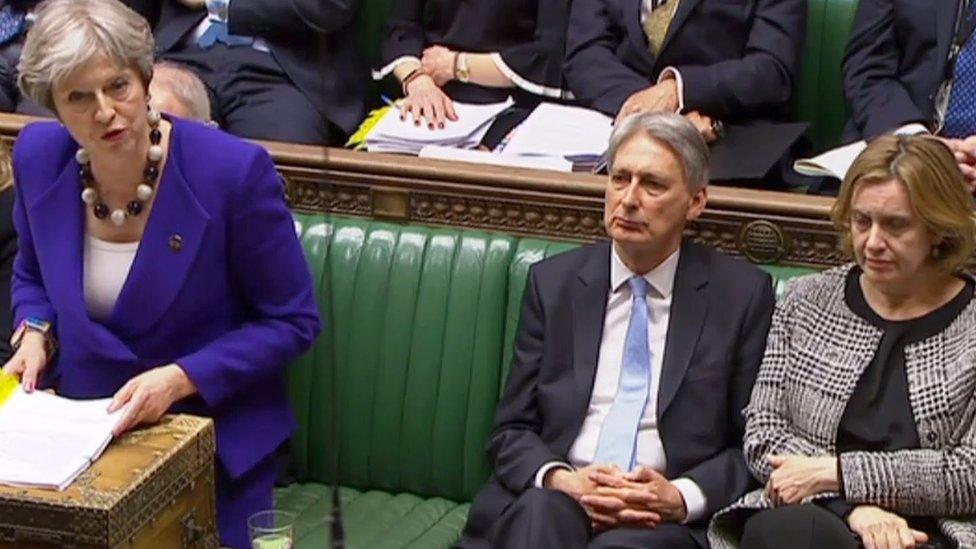Who knew what, when?
- Published

The government is a big machine.
There is no way that any one person could ever be aware of what every cog and widget is up to at any one point. It's not reasonable to expect them to know about absolutely everything.
But it is, however, the expectation that ministers are responsible for what is being done in the public's name, and at the taxpayer's expense. That's why when things go wrong in Westminster and Whitehall, which they of course do from time to time, that the two big questions that are often asked are who knew, and when.
As the Windrush scandal has unfolded it has been said again and again that the Home Office were not aware of the problem as a pattern where one particular group was being scooped up into the immigration system unfairly, on multiple occasions.
Yes, individual cases reared their heads, we know they were raised as far back as 2011. But Amber Rudd repeated to MPs again today she wasn't aware of the issue as being "systemic", even though she "bitterly regrets" not spotting the pattern.
Ministers' defence has been: we simply didn't realise, but we know now it was a big mistake.
That defence looks a bit shakier tonight. It's not just that some of the government's own work on immigration policy warned in advance of the rules changing that it could hypothetically hit the wrong people.
But we know now that the foreign secretary in 2016, who happens to have been Philip Hammond, was told by ministers in the Caribbean in April of that year about the problem.
I'm told it was in the margins of the meeting rather than the subject of a huge ding dong. But shortly after, in May 2016, they also received a letter from the Barbados government about the scale of the concern.
Explained: What is the 'hostile environment' policy?
The point of diplomacy is to convey messages to governments. So as you might expect, what happened subsequently, I'm told, was that the Foreign Office raised the concern with Number 10 at the time, and also with the Home Office which was in charge of the policy.
And of course, guess who was in charge of the Home Office at that moment? One Theresa May.
That's the 'when'. What's less clear is the 'what'. We don't know precisely what was said, or how seriously the issues were presented.
We don't know if the home secretary at the time herself saw the warning. But we do know that almost two years ago the problems of the Windrush generation were raised, however briefly, at the highest levels of government.
In the coming weeks, we might find out what really happened next.
That won't exactly provide much of a relief for Amber Rudd, the current incumbent. With Labour calling for her resignation, and a difficult afternoon being questioned by MPs earlier, she has other problems to try to resolve.
On one point of fact there is confusion tonight. The ISU, the immigration union, told MPs that there are removals targets for forcing those here illegally out of the country.
And it's been suggested in many quarters in recent days that the pressure to remove illegal immigrants and the focus on getting the numbers down has been part of the problem at the Home Office.
But neither the home secretary, nor the senior civil servant alongside her, accepted that those targets really exist. So who's right?
Tonight, all the Home Office can say is: "We want immigration enforcement to deport more people who are here illegally and tackle illegal immigration which puts pressure on taxpayer-funded public services and exploits the vulnerable.
"But it's never been Home Office policy to take decisions arbitrarily to meet a target."
Note that does not mean there are no targets, it simply says they don't use them, if they exist, in an arbitrary and unfair way.
The home secretary's reputation depends on getting a handle on this mess. One of her cabinet colleagues told me the "suspicious attitude" of the Home Office culture had to change.
But there is still a tangle of loose ends - right now it's not possible to be sure exactly what is going on.